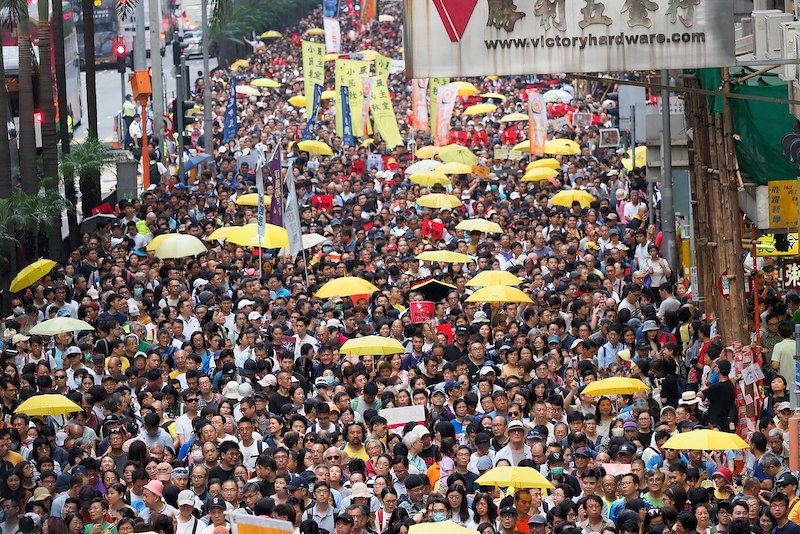An extradition bill that brought nearly two million Hong Kong citizens into the streets in protest is merely the latest step to suppress political freedom in the special administrative zone owned by China, says a professor of history and Asian studies at the University of British Columbia.
Leo K. Shin said Hong Kong’s chief executive Carrie Lam wants observers to believe that the former British colony has been calm and peaceful since the protests and chaos during the pro-democracy Umbrella Movement of 2014.
“But I think it’s fair to say that there has been a gradual clamping down on dissent in Hong Kong... And I think the latest bill, the extradition bill... [is] really the last example of that,” Shin said.
“What people are concerned most is that it is yet another step, and a very important step, towards the taking away of freedom in Hong Kong, and that is what concerns Hong Kong people the most.”
Shin spoke Tuesday along with three other academics at a roundtable discussion at UBC on the extradition bill, Canada’s response to it and the future of Hong Kong. Held in the C.K. Choi building and attracting a few dozen participants, the roundtable was hosted by UBC Centre for Chinese Research and the Hong Kong Studies Initiative.
Lam had tried to pass the extradition bill through Hong Kong’s Legislative Council before its summer break in July. The bill had sparked fear in Hong Kong because it would allow the government to transfer suspects or wanted fugitives to mainland China where human rights are questionable at best.
The bill incited almost a week of protests, with a march on June 16 reaching almost two million citizens, most of them young people. Lam suspended the bill and made a public apology Tuesday, but she stopped short of resigning, which many protesters had called for.
Hong Kong has been rocked in recent years with protests including the Umbrella Movement, when students protested the denial of universal suffrage.
Wai Yip Ho, a professor in the department of social sciences at the Education University of Hong Kong, watched as young students protested in Central, where the Legislative Council Building is, on June 12.
“What government did, actually, was bury the trust of this generation,” Ho said. “I would say the young generation will not trust the government.”
Most of the students, he said, had no weapons and some wore uniforms. “When the government say this is organized riot, manipulated by some people. I see another picture… We see they are the defenders — they are the defenders of the future of Hong Kong. And I will say many of the people should be grateful for what they did for Hong Kong.”
Ho said he saw the younger generation inspiring the older generation to join in the protests when previously many parents barred their children from participating in open political defiance.
Canadians showed support for Hong Kong by protesting outside the Chinese consulate in Vancouver on June 11, but according to history professor Diana Lary, who studies Chinese history, more advocacy needs to be done.
“I think we have to all put as much pressure as possible on Canada to speak up for Hong Kong,” she said. “I would urge all of you to be in touch with your members of parliament and whoever else you can think of, because as Hong Kong struggles for freedom and for their right to determine their fate, we should be in absolutely full sympathy with them.”
Pitman Potter, director of Chinese legal studies at UBC’s Peter A. Allard School of Law, said the Hong Kong Bar Association has raised several objections to the Hong Kong government about the extradition treaty in light of the problematic nature of the rule of law and human rights in China. Potter said the government has not responded to the bar association’s concerns.
Potter said the rule of law is different in China, where it is used as an instrument of rule. Law in China serves the political interests of the governing Communist party, he said, and rights under the rule of law in China are so constrained that it’s almost impossible to “speak in the same language as we speak of the rule of law and legal rights in [Canada].”
Although the bill’s suspension is essentially a withdrawal, Lam refused to retract her description of the protests as an “organized riot.” She also declared that she would not step down, much to the dissatisfaction of many in Hong Kong.
“My concern is how are things going to wrap up, how are things going to end?” Shin said. “How do we avoid conflict, bloodshed and violence? How does it know where to draw a close? As long as Carrie Lam sticks to her guns, refusing to say the words that want to be heard, she’s not providing steps for it to de-escalate.” ![]()
Read more: Rights + Justice, Politics
















Tyee Commenting Guidelines
Comments that violate guidelines risk being deleted, and violations may result in a temporary or permanent user ban. Maintain the spirit of good conversation to stay in the discussion.
*Please note The Tyee is not a forum for spreading misinformation about COVID-19, denying its existence or minimizing its risk to public health.
Do:
Do not: